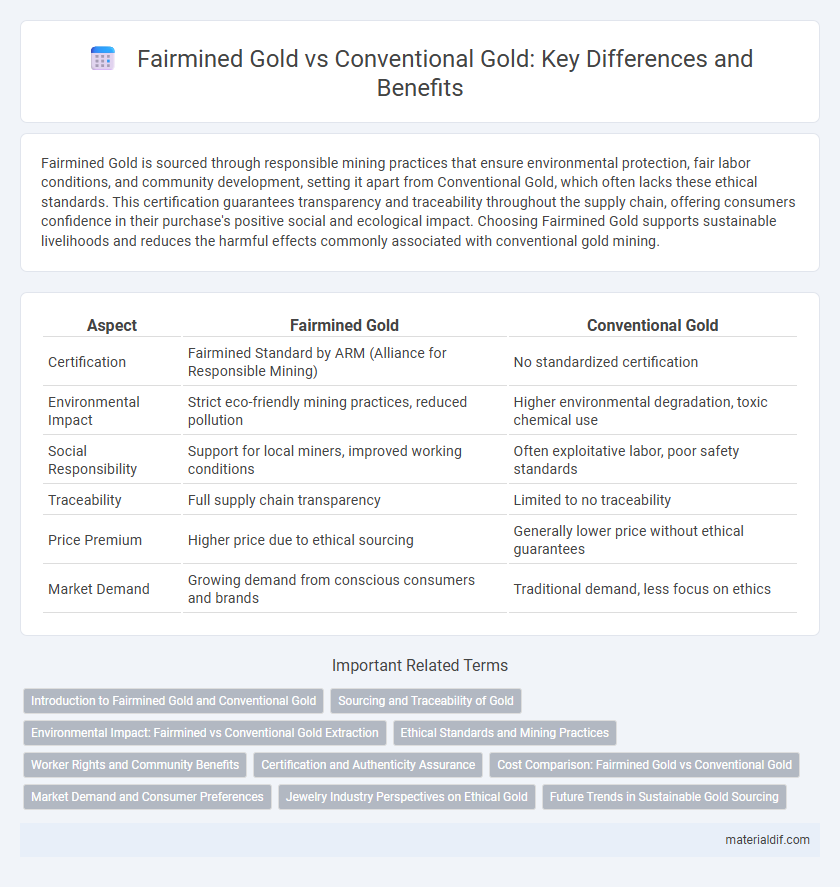Fairmined Gold is sourced through responsible mining practices that ensure environmental protection, fair labor conditions, and community development, setting it apart from Conventional Gold, which often lacks these ethical standards. This certification guarantees transparency and traceability throughout the supply chain, offering consumers confidence in their purchase's positive social and ecological impact. Choosing Fairmined Gold supports sustainable livelihoods and reduces the harmful effects commonly associated with conventional gold mining.
Table of Comparison
| Aspect | Fairmined Gold | Conventional Gold |
|---|---|---|
| Certification | Fairmined Standard by ARM (Alliance for Responsible Mining) | No standardized certification |
| Environmental Impact | Strict eco-friendly mining practices, reduced pollution | Higher environmental degradation, toxic chemical use |
| Social Responsibility | Support for local miners, improved working conditions | Often exploitative labor, poor safety standards |
| Traceability | Full supply chain transparency | Limited to no traceability |
| Price Premium | Higher price due to ethical sourcing | Generally lower price without ethical guarantees |
| Market Demand | Growing demand from conscious consumers and brands | Traditional demand, less focus on ethics |
Introduction to Fairmined Gold and Conventional Gold
Fairmined Gold is certified gold extracted from artisanal and small-scale mining organizations that meet rigorous social, environmental, and economic standards, ensuring ethical sourcing and sustainable practices. Conventional gold, by contrast, often comes from large-scale mining operations with varying degrees of environmental impact and less stringent oversight on labor conditions. Consumers choosing Fairmined Gold support responsible mining that protects ecosystems and guarantees fair wages for miners.
Sourcing and Traceability of Gold
Fairmined Gold is sourced from artisanal and small-scale mining organizations that adhere to strict social, environmental, and economic standards, ensuring responsible mining practices. Its traceability is guaranteed through a transparent certification system that tracks the gold from the mine to the end consumer, providing full supply chain visibility. Conventional Gold often lacks verifiable traceability, with sourcing that may include large-scale and unregulated mining operations, increasing risks of unethical practices and environmental harm.
Environmental Impact: Fairmined vs Conventional Gold Extraction
Fairmined gold extraction significantly reduces environmental impact by adhering to strict standards that prevent mercury and cyanide pollution, protect biodiversity, and ensure responsible waste management. Conventional gold mining often involves large-scale operations that generate harmful tailings, deforestation, and contamination of water sources with toxic chemicals. Fairmined practices promote sustainable land use and rehabilitate mining sites, minimizing ecological damage compared to conventional methods.
Ethical Standards and Mining Practices
Fairmined Gold adheres to rigorous ethical standards, ensuring responsible mining practices that prioritize environmental protection, community well-being, and fair labor conditions. Conventional gold mining often involves significant ecological damage, poor labor practices, and limited transparency in supply chains. The Fairmined certification guarantees traceability and social fairness, contrasting with the frequently exploitative methods of conventional gold extraction.
Worker Rights and Community Benefits
Fairmined Gold certification ensures strict adherence to fair labor practices, guaranteeing safe working conditions, fair wages, and empowerment of artisanal miners, contrasting sharply with the often exploitative labor standards found in conventional gold mining. The Fairmined standard promotes community development by mandating that a percentage of profits be reinvested into local infrastructure, education, and healthcare, fostering sustainable socio-economic growth. Conventional gold mining frequently neglects these community benefits, leading to environmental degradation and limited local advancement.
Certification and Authenticity Assurance
Fairmined Gold certification guarantees ethical sourcing by ensuring miners meet stringent environmental and social standards, providing a reliable traceability system from extraction to market. Conventional Gold often lacks transparent certification processes, leading to potential risks of unethical practices and limited authenticity assurance. Buyers seeking verified ethical gold value Fairmined's robust authentication framework that supports sustainable mining communities.
Cost Comparison: Fairmined Gold vs Conventional Gold
Fairmined Gold typically involves higher production costs due to stringent ethical labor standards and environmental safeguards, resulting in a price premium compared to conventional gold. Conventional gold mining often benefits from economies of scale and less rigorous social compliance, making its cost lower but associated with environmental and human rights risks. Consumers pay more for Fairmined Gold, reflecting the investment in sustainability and fair labor practices embedded in its certified supply chain.
Market Demand and Consumer Preferences
Fairmined Gold appeals to a growing market segment prioritizing ethical sourcing, traceability, and environmental sustainability, driving increased demand among socially conscious consumers. Conventional Gold, often linked to opaque supply chains and environmental concerns, faces challenges in meeting shifting consumer preferences towards transparency and responsible mining. Retailers and jewelers report higher willingness to pay premiums for Fairmined Gold, reflecting a market trend favoring ethically certified precious metals.
Jewelry Industry Perspectives on Ethical Gold
Fairmined gold offers jewelers a verified ethical sourcing option that ensures fair labor conditions and environmental responsibility, distinguishing it from conventional gold often linked to unethical mining practices and supply chain opacity. Consumer demand within the jewelry industry increasingly favors Fairmined gold due to its certification standards, which enhance brand transparency and appeal to socially conscious buyers. Integrating Fairmined gold supports sustainable practices while maintaining high-quality craftsmanship, positioning it as a preferred choice for ethical and luxury jewelry markets.
Future Trends in Sustainable Gold Sourcing
Fairmined Gold, certified for ethical mining practices, sets a growing standard in sustainable gold sourcing compared to conventional gold, which often involves environmentally harmful extraction methods. Increasing consumer demand for transparency and corporate responsibility drives investment in Fairmined certification, promoting social equity and reducing ecological impact. Future trends indicate accelerated adoption of blockchain for traceability and expanded partnerships between Fairmined cooperatives and global jewelry brands.
Fairmined Gold vs Conventional Gold Infographic

 materialdif.com
materialdif.com